|
April 29, 2006
Presenting: Jorge Torres from the CETLALIC
Alternative Language School - Learning Spanish with Social, Political
and Cultural Awareness
My stay in Cuernavaca this past April was filled with many experiences:
travel experiences; historic, cultural and culinary explorations;
new friendships and , most notably, learning experiences. During
my second week I spent several days learning Spanish at the CETLALIC
Alternative Language School.
I was in a class with 2 other students with very advanced level
knowledge and the three of us worked hard to master the intricate
details of the Spanish language. It goes without saying that several
days were spent on working with the Spanish subjunctive (an old
staple for Spanish language learners).
CETLALIC is an alternative language school and its founder, Jorge
Torres, and his employees dedicate themselves to social and political
activitism to help bring more justice to Mexican society. During
our lectures we heard some interesting information about the Zapatista
movement and we also discussed social issues, such as the current
shortage of water and the unequal distribution of resources, including
water, in Mexican communities.
Jorge Torres has a very strong connection to the Mexican workers
movement and has been active for several decades to help bring about
social change. Many of CETLALIC's students come from non-profit
organizations or activist groups and in line with his policy of
inclusiveness, CETLALIC also welcomes gay and lesbian students and
provides gay and lesbian-friendly accommodations with local families.
Here is Jorge Torres and he will tell us about how his strong commitment
to social causes came about. He will give us an overview of his
special programs directed to groups such as healthcare workers,
ministers, and others and he will give us an overview of his 3x3
work-study program. Jorge will tell us how CETLALIC today contributes
to making Mexico a juster society.
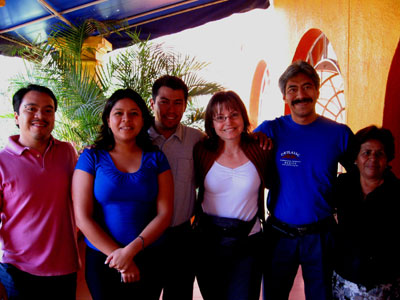
The team at Cetlalic with Jorge Torres (2nd from the right)
1. Please tell us a bit about yourself and your personal
background. How did you get involved in the field of language teaching?
By accident, I was studying my first year in a college and one of
my teacher invited me to attend a course for teaching Spanish for
foreigners. I took it and with time I really enjoyed teaching my
language and my culture.
I am from the lower class, my father worked for almost 20 years
in a textile factory belonging to a US firm, and my mother worked
for many years as domestic worker. We don´t use "maid”
or servant", this is so offensive.
2. Your father was involved in the Mexican workers' movement. How
did that influence you and your view of the world?
Of course it was a tremendous influence, because of the many meetings
they had. They were at home and they talked about the terrible situation
of exploitation, low payment and other things. I helped my father
and his colleagues to distribute flyers in front of the factory,
by the door when the workers were leaving.
That helped me to understand about our reality, about our difficult
situation. Especially when he and others were fired, and they held
a sit-in (like a strike) in front of the factory, because the owners
didn´t want to pay the severance pay that they owed to the
employees by law.
3. Please tell us a bit about Mexico, its history and
its social, cutural and political background.
Oh, this is such an interesting question but, at the same time,
I would need a lot of time to explain this. I could just say that
in Mexican history the people at the bottom, el pueblo,
the real people always have been used by others, those from the
elites, in order to benefit a few of them. The poor people always
have been at the forefront of the big struggles (like the Independence
war in 1810; or the Mexican Revolution in 1910) and they were being
killed. But once the change came through, they didn’t receive
what the leaders had promised to them.
The poor people always believe in some leaders and many times they
expect a solution to their problems (land, food, education, democracy,
liberty, support, and so on).
We are a rich culture, we have more than 3, 500 years of history,
we have a beautiful country with a lot of natural resources. We
are an optimistic and happy culture, we like to laugh, to dance,
to sing. BUT the inequality and the oppression from the different
governments has been our big problem. And also some US administrations,
sometimes, have been trying to keep us in a situation of underdevelopment.
It would take so long to explain why.
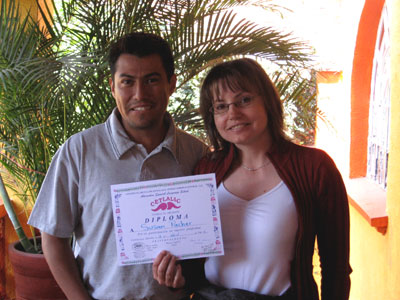
Moi with my Spanish teacher Mario (including my certificate)
4. How did Cetlalic
come into being and how did has it evolved since 1987?
In 1987, we were a committee in solidarity with the people in El
Salvador. In Morelos during the 70´s and the beginning of
the 80´s, we had a progressive catholic bishop, Don Sergio
Mendez Arceo. And for many years the people in this state, Morelos,
especially Cuernavaca, were supporting the refugees from Central
America. So we were one of the groups for solidarity.
Because we didn´t have money for our activities or for helping
more of the refugees, we decided to become a self-sufficient organization.
We decided to become a language school, because there were many
languages schools in Cuernavaca. And we believed it was going to
be easier to bring in foreigners to study Spanish so they would
learn about the Latino-American culture and the reality.
We didn´t know how difficult the recruiting was going to be.
We didn´t know anything about marketing.
5. Your school is different from other language schools
in that it is an "alternative language school" as it also
dedicates itself to social and political activitivism. Please tell
us more about that.
CETLALIC was founded in 1987 as an alternative school, integrating
intensive study of Spanish language with experiential cultural learning
and analysis of current issues with grassroots organizations and
others who are actively involved in their society.
CETLALIC is small and our staff is able to attend to the needs of
each student. Our goal is to promote dialogue between Mexico and
the people of other cultures and, in order to reach that goal, we
make the experience of every participant our concern. We welcome
all students irrespective of nationality, ethnic origin, race, gender,
sexual preference, age, etc.
6. Please tell us about your Spanish language classes, your
class facilities, your weekly schedule and your teaching faculty.
Our Spanish language program is demanding, but in a friendly atmosphere.
Classes are limited to five students. Every morning, there are three
hours of intensive language instruction from 9 to12, followed by
a "práctica" session from 12 to 2, in
which students participate in round table discussions on a variety
of national & international topics. CETLALIC
is accredited by the Ministry of Public Education (State of Morelos,
Mexico).
We offer small, intensive classes at all levels, year-round, as
well as several Special Programs every year, each focused on a particular
issue or area of interest, which often include travel in the region.
7. You use a unique method to teach Spanish: the Paulo
Freire Method. Please give us an overview of this teaching methodology.
Paulo Freire's methodology is applied to the teaching of Spanish
as a second language and students are expected to contribute their
insights and ask the questions necessary for critical analysis.
Our teachers are native speakers with professional training and
extensive experience.
8. Many of your students stay in homestays. Please
describe this accommodation method and its advantages.
Living with a Mexican family is an integral part of our program.
It provides a unique experience to learn about the people, their
food and their customs, as well as an incomparable opportunity for
students to practice and refine their Spanish language abilities.
All our families welcome gay/lesbian students. We are also proud
to offer gay or lesbian homestay options in which our gay/lesbian
students can feel comfortable.
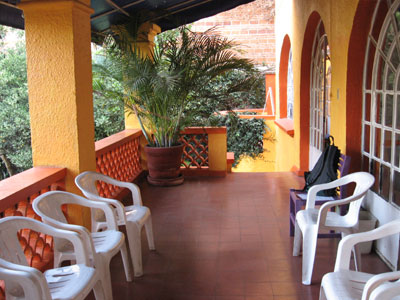 Our classes were held on this beautiful balcony
Our classes were held on this beautiful balcony
9. Please tell us about the excursions and cultural activities
that you offer to your students.
Cultural activities are also offered throughout the week and include
excursions, visits with native speakers from Mexico and Latin America,
videos, and participation in local fiestas and other cultural events.
We visit several museums in Mexico City, some archeological sites
(like Teotihuacan in State of Mexico, Xochicalco and Teopanzolco
in Morelos; we go to colonial towns like Taxco (silver capital in
Guerrero State, Mexico), Puebla, and we also take the students to
beautiful small towns near by, like Tepoztlan and Tlayacapan.
10. You offer a variety of special programs in your school.
Please tell us about your special programs for healthcare workers,
educators and ministers.
LANGUAGE AND CULTURE FOR HEALTHCARE WORKERS:
For present and future healthcare workers looking for better understanding
with the Hispanic population and for all interested in health issues
and terminology.
This 3-week program is meant for all those who work in healthcare:
nurses and family doctors as well as specialists and midwives. You
will learn about the healthcare system in Mexico and about the way
workers are organized. We will talk about social and cultural issues
like health and human rights, health and spirituality, birth control
methods, working with contagious illnesses, speaking with Latino
patients, talking about domestic violence, the place of elderly
or handicapped people in our society among others.
Every week focuses on a special theme: traditional, institutional
and alternative healthcare. You can subscribe one, two or three
weeks of the program, depending to your needs and interests.
We highly recommend to take the three weeks so you improve your
Spanish and have a deep understanding of the healthcare system.
12. Some of your special programs concentrate on social
issues, such as the Mexican workers movement, social movements and
popular resistance, multicultural and women's issues. Please give
us more information about those programs.
MULTICULTURAL MEXICO
Cuernavaca and Chiapas.
In Mexico the multicultural society is a fact. For centuries different
peoples have been living in the same country. But do they really
live together? During a week-long stay in Cuernavaca and a travel
program of another week, we learn about the different groups. We
see the influence of the culture of the indigenous peoples on the
culture of the mestizos and vice versa throughout history until
today, but we learn also how other groups like Germans, Lebanese,
Jews, Chinese, Spanish and Afromexicans integrate in Mexican society.
We learn to know the cultural heritage of Aztecs, Nahua and other
indigenous peoples and current Mexican conditions.
Multicultural Mexico includes:
- 1 week in Cuernavaca
Daily intensive Spanish language instruction with a schedule from
9:00 a.m. to 12:00 p.m., Monday to Friday. Students are placed in
classes at the appropriate skill level with a maximum of five students.
- The afternoon ‘práctica’ from 12:20
p.m. to 2:00 p.m. on Monday, Wednesday and Friday, includes classes
focusing on vocabulary of multicultural themes, culture, history
and Zapatist movement, reading texts and discussing issues of interest
for the theme of the program.
- On Tuesday and Thursday from 12:20 p.m. to 2:00 p.m. and on three
moments during the week in the afternoon or evening, we visit organizations
and invite people to come and tell about their experiences.
- 1 week travelling to Mexico City and Chiapas (San Cristóbal
de las Casas and Palenque), visiting places of interest in order
to learn about Mexico´s cultural heritage and current realities.
We will spend 2 nights in an indigenous village to celebrate the
uprising of January 1994.
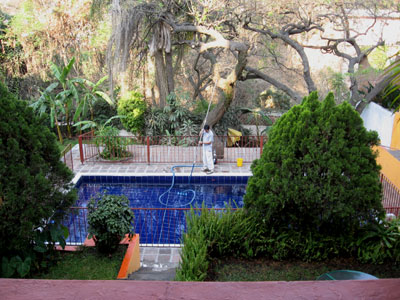
CETLALIC
- a language school with a swimming pool!
LANGUAGE AND CULTURE FOR EDUCATORS
For present and future bilingual educators as well as all those
who would like to gain the skills and knowledge necessary to better
serve Spanish speakers in their classes. A 3 week program that includes
intensive Spanish classes and a variety of cultural/educational
activities such as weekend excursions, guest speakers, museum visits,
roundtable discussions, encounters with local schools k-12+ and
community groups, videos, etc.) and a homestay. Participants will
increase their knowledge and understanding of Mexican educational
system. School visits provide the opportunity to interact with students
in Spanish, as well as to discuss subjects of mutual interest with
teachers and administrators. Most program activities are in Spanish
with English translations when necessary.
LANGUAGE AND CULTURE FOR MINISTERS:
Throughout the program there will be Biblical reflections and devotions
in Spanish so that students become familiar with the vocabulary
related to ministry. Finally the program will culminate with a eucharistic
celebration using El Libro de Liturgia y Cántico as the primary
worship resource.
First week: The program begins in Mexico City. We explore the context
in which we do ministry by seeing how the Mexican reality relates
to the Latino immigrant experience in the United States. We will
learn about Mexican history that has lead to the current situation
as well as the impact of global economics. We will visit with organizations
working in solidarity with campesinos, defending immigrant rights
and creating alternative economic models for a more just and humane
society.
Second week: The program moves to Cuernavaca known as the “city
of the eternal spring” because of its favorable climate. It
is also the place where the Christian Base Communities were born
in Mexico. The CBC's represent a movement of the “grassroots”
church gathering in small groups primarily of the poor reflecting
on Scripture as a means of organizing for better living conditions
and a more equitable society. We begin learning about the history
and formation of the CBC's that can serve as a model for ministry
within Latino communities in the U.S. We will dialog with priests
and lay leaders who are active in the CBC's as well as participate
in a CBC meeting.
Third week: We see how the CBC's provide a foundation for organizing
in defense of human rights, environmental protection and fair trade
practices. We will visit local community projects and hear from
leaders active in these movements. We will begin to integrate the
training to anticipate how this can be incorporated into our home
settings.
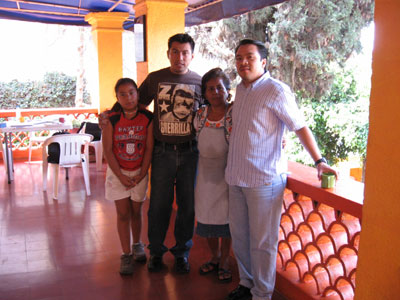
Some of the CETLALIC team members, including my teacher Mario (2nd
from left)
11. A variety of other special programs at your school focus
on lesbians and gays. Please give us more information about these
special programs.
OUR PROGRAMS FOR GAYS AND LESBIANS.
I think we are the only language school in Mexico who provide and
organize this kind of programs. We have three programs during the
year for two and three weeks.
A 3 week program that includes intensive Spanish classes and a variety
of cultural/educational activities (such as trips, speakers, discussions,
encounters with local groups and artists, videos, etc.) and a gay/lesbian
homestay.
Cost (US$ 1, 550) Includes full room (shared) and board in a gay
homestay, 3 weeks of intensive Spanish instruction, educational
materials, local excursions in Cuernavaca and one weekend in Mexico
City to attend the Gay Pride March. Cost does not include round
trip air fare to Mexico City. $ 100 deposit due at the time of application,
refundable only in the unlikely event that CETLALIC cancels the
program. Childcare available at a minimal extra cost.
Some of the activities we had last year were:
Lectures: - History of the Gay Movement in Mexico
- Cultural Differences
- Testimonies or Stories of Mexican Men
- Homosexuality and Spirituality (by the Metropolitan Church Minister
in Cuernavaca)
Visits: - Robert Brady Museum in Cuernavaca
- Enoe Uranga (another open lesbian in Congress and who is proposing
the Domestic Partnership Law)
- Tito Vasconcelos Drag Show
- Gay Cultural Month in Mexico City Activities
- Gay Pride March in Mexico City
- Gay Bars in Mexico City and Cuernavaca
- Plus socializing a lot with the Cuernavaca community!
Activities for the summer, autumn and winter will be very similar
and we will add other upon interest of the participants.
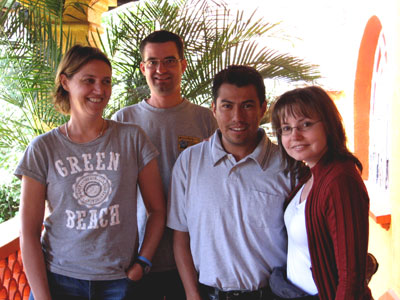
My class (two co-students from Germany, Mario, I)
WOMEN AND SOCIAL CHANGE IN MEXICO
January 2007
For all women interested in studying Spanish while learning about
Mexican culture, politics and economics through the lens of women's
experience and struggles for social justice. Study how women from
various backgrounds (i.e. indigenous, students, workers) have been
affected by neo-liberal model of globalization and the kinds of
mobilizations they have initiated or participated in. Establish
and strengthen links between women of different countries (whose
lives in an increasing globalized world are more interrelated than
ever) by sharing our respective struggles for justice and equality.
ACTIVITIES
Talks, videos and visits with women and grassroots projects are
scheduled during the afternoon. Themes will be approached "from
below" by spending time with activist groups and with an orientation
towards social change.
Topics may include:
NAFTA, globalization and "neo-liberalism" in Mexico as
well as the independent labor movement and maquiladoras
Zapatismo and the struggles of indigenous women
Feminism, women's health, alternative medicine, sexual and reproductive
rights and the lesbian movement in Mexico
Alternative media and a visit to a women's video collective
The 1999/2000 student movement and strike at UNAM (the National
Autonomous University of Mexico)
Politics and the recent elections
Liberation Theology and Christian Base Communities
Globalization and the environment
Among other activities we will probably have visits to:
+ CIDHAL Women's Centre in Cuernavaca
Their website is: http://www.laneta.apc.org/cidhal/index.html
+ Frida Kahlo Museum and other places in Mexico City determined
by availability and participant interest
For more information about CETLALIC’s special programs visit:
http://www.cetlalic.org.mx/special.htm
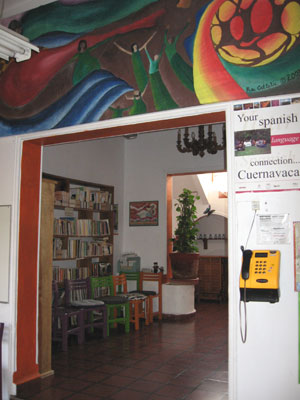
CETLALIC's library and an interesting mural
13. Please tell us about your innovative 3x3 work-study
opportunities.
Some people, some of them social activist or students, don´t
have enough money to pay for our courses. We don’t give scholarships,
but we help them with our 3x3 exchange program.
WORK-STUDY OPPORTUNITIES AT CETLALIC
CETLALIC
works together with grassroots organizations and others who are
actively involved in their society, we strive to integrate intensive
study of Spanish language with experiential cultural learning and
analysis of current social and political issues. Our goal is to
promote dialogue between Mexico and the people of other cultures,
in order to reach that goal, we make the experience of every participant
our concern. We welcome all people regardless of nationality, ethnic
origin, race, gender, sexual preference, age, etc.
In this special program, the students pay registration fees, transport
to Cuernavaca, room & board (about $US600.month in a private
room with a Mexican family or US$400 in an apartment). In this work-study
program, volunteers work for 3 hours a day (12:00 to 3:00 pm) while
they receive 3 hours of Spanish language instruction in the morning.
CETLALIC also assists with securing a tourist visa and accommodation.
The program duration is between 5 and 12 weeks. For more information
check this web page: http://www.cetlalic.org.mx/3x3.htm
14. Where do your students come from and what kind of experience
are they looking for?
the most of them come from the USA, 80 %, 10 % from Canada, both
parts, and the other 10% from Europe.
They are looking to learn Spanish, but also to know about Mexico
and the people. Our students are really focused on learning and
exchanging personal and social experiences. They are looking for
a community with respect and tolerance.
Let me thank you, Jorge, for sharing your own personal story and
information about your alternative language school. We wish you
and your team at CETLALIC
and all your students the very best and continued success with your
efforts.
Useful Books:
Related Articles:
Mexico 2006 - My cultural immersion
experiment
Hello from Mexico City - First impressions
Hello from Mexico City - A skyscraper,
a little horse and a government pawn shop
Hello from Mexico City - The Zócalo,
the Cathedral, a healing ritual and a university dedicated to a
16th century female poet
Hello from Mexico City - A relaxing
evening in Coyoacán
Hello from Mexico City - Exploring the
Paseo de la Reforma, de Bosque de Chapúltepec and a nice
evening in San Angel
Hello from Cuernavaca - Arrival and
first impressions
Hello from Cuernavaca - Getting to know
my B&B hostess Marta Elena: A true riches to rags story
Hello from Cuernavaca - My first day
learning Spanish and two local icons: the Robert Brady Museum and
the Jardín Borda
Hello from Cuernavaca - A lovely dinner
in a garden paradise
Hello from Cuernavaca - An excursion
to Las Estacas, checking out orchids and a meeting at El Cafecito
Hello from Cuernavaca - An excursion
to Lake Tequesquitengo and a visit to the doctor
Hello from Cuernavaca - A conversation
with Andy Grater, local B&B owner and President of the Newcomers
Club
Hello from Cuernavaca - A presentation
about ecology at the Newcomers Club Meeting
Hello from Cuernavaca - Opening of a
South African photo exhibition and a visit to the Palacio de Cortés
Hello from Taxco - The city that silver built
Hello from Taxco during Semana Santa - The
famous Palm Sunday Procession
Hello from Cuernavaca - A new language
school, visiting 'Casa Vamos' and an evening with a very sad ending
Hello from Cuernavaca - My most intense
day: more language studies, 3 interviews, a guided eco-hike and
dinner at the Marco Polo
Hello from Cuernavaca - A day outing
to the enchanting mythical village of Tepoztlan
Hello from Cuernavaca - My last day
of school and a visit to Cuernavaca's Spring Fair
Hello from Taxco - An eerie experience: Visiting
Taxco's famous Good Friday procession
Hello from Taxco and Cuernavaca - Interviewing
one of the penitentes and enjoying my last day in Mexico
Related Interviews:
Presenting:
Ruben Córtes from Morelos Trails - Local adventure sports
and cultural guided tour operator, expert on Morelos and Cuernavaca
Presenting: Pablo
Buitrón from Fundacion Comunidad, helping local
women empower themselves
Presenting: Jorge Torres from
the Cetlalic Alternative Language School - Learning Spanish with
cultural, social and political awareness
Presenting: Hermilo Brito
from the Ideal Language School - Making Spanish learning fun
Helpful links:
Mexico
Tourism Information
State
of Morelos Tourism Organization
Official
website of the City of Cuernavaca tourism
|